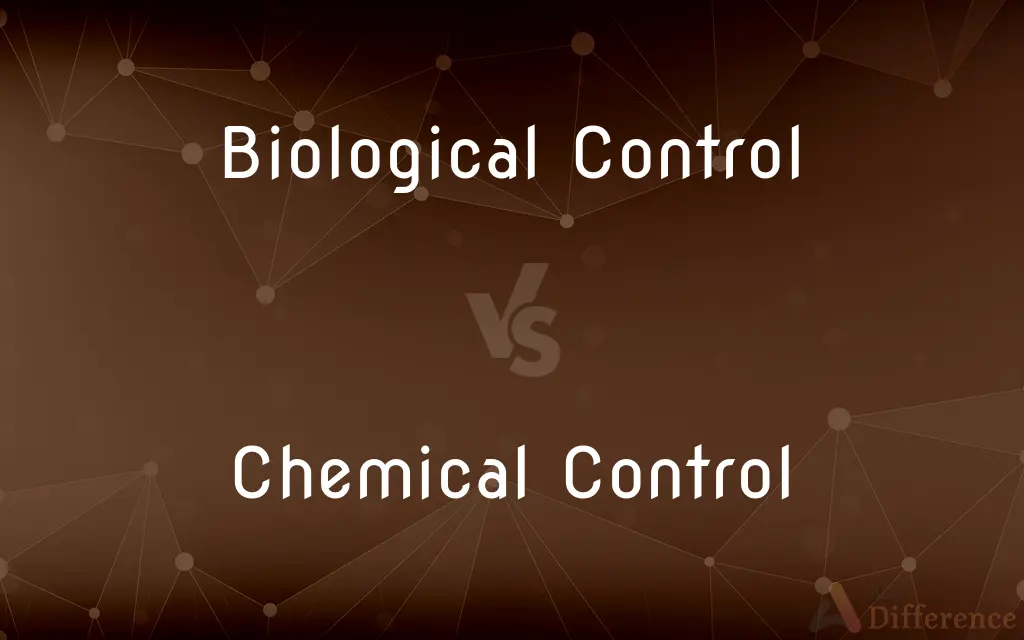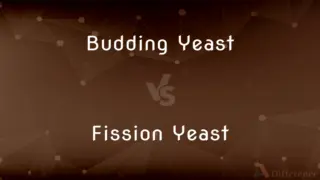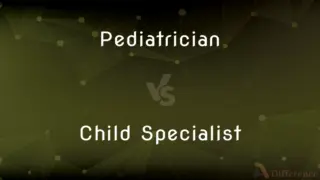Biological Control vs. Chemical Control — What's the Difference?
By Tayyaba Rehman — Updated on October 16, 2023
Biological Control uses living organisms to control pests; Chemical Control uses synthetic or natural chemicals. Both aim to manage pest populations.

Difference Between Biological Control and Chemical Control
Table of Contents
ADVERTISEMENT
Key Differences
Another noteworthy distinction is the specificity and speed of action. Biological Control can be very targeted, affecting only the intended pest, whereas some chemical methods can affect a broader range of organisms. On the flip side, Chemical Control often acts faster than its biological counterpart but may require repeated applications.
Tayyaba Rehman
Oct 15, 2023
One significant difference between Biological and Chemical Control is their impact on the environment. While Biological Control is often viewed as a more sustainable and environmentally friendly approach, because it utilizes nature's own mechanisms, Chemical Control can sometimes lead to issues like pesticide resistance in pests, environmental contamination, and harm to non-target organisms.
Tayyaba Rehman
Oct 15, 2023
Biological Control and Chemical Control are two primary methods used to manage pests in various settings, including agriculture. Biological Control involves the introduction or encouragement of natural enemies, such as predators, parasites, or pathogens, to control pest populations. For instance, ladybugs can be introduced to a garden to manage aphids, demonstrating the principle of using one living organism to control another.
Tayyaba Rehman
Oct 15, 2023
In contrast, Chemical Control uses either synthetic or naturally derived chemicals, called pesticides, to eradicate or reduce pests. For example, insecticides can be sprayed on crops to prevent insect damage. These chemicals can act in various ways, including killing the pest, repelling it, or disrupting its ability to reproduce.
Tayyaba Rehman
Oct 15, 2023
In terms of application, both Biological and Chemical Control have their places. Some situations may benefit from a combination of both, while others might be more suited for one over the other. The decision often hinges on factors like the type and severity of the pest problem, environmental concerns, and economic considerations.
Tayyaba Rehman
Oct 15, 2023
ADVERTISEMENT
Comparison Chart
Primary Agents
Living organisms (predators, parasites, pathogens)
Synthetic or natural chemicals (pesticides)
Tayyaba Rehman
Oct 15, 2023
Environmental Impact
Often environmentally friendly
Can lead to environmental contamination
Tayyaba Rehman
Oct 15, 2023
Speed of Action
Generally slower, may require time to establish
Often acts faster and can be immediate
Tayyaba Rehman
Oct 15, 2023
Specificity
Targets specific pests without affecting non-target organisms
Can affect a range of organisms
Tayyaba Rehman
Oct 15, 2023
Application Frequency
Often a one-time introduction or occasional releases
Might require repeated applications
Tayyaba Rehman
Oct 15, 2023
ADVERTISEMENT
Definitions
Biological Control
Biological Control can involve predators, parasites, or pathogens.
Releasing parasitic wasps is a form of biological control against certain pests.
Tayyaba Rehman
Oct 04, 2023
Chemical Control
Chemical Control uses pesticides to manage pests.
The farmer sprayed insecticide as a chemical control against locusts.
Tayyaba Rehman
Oct 04, 2023
Biological Control
Biological Control promotes environmental balance.
Biological control helps maintain a balanced ecosystem.
Tayyaba Rehman
Oct 04, 2023
Chemical Control
Chemical Control may lead to pesticide resistance.
Overuse of chemical control caused the insects to become resistant.
Tayyaba Rehman
Oct 04, 2023
Biological Control
Biological Control uses natural enemies to manage pests.
The farmer introduced ladybugs for biological control of aphids.
Tayyaba Rehman
Oct 04, 2023
Chemical Control
Chemical Control can be broad-spectrum or targeted.
The broad-spectrum chemical control affected multiple pests in the field.
Tayyaba Rehman
Oct 04, 2023
Biological Control
Biological Control is often specific to the target pest.
The fungus released for biological control only affected the invasive beetles.
Tayyaba Rehman
Oct 04, 2023
Chemical Control
Chemical Control can act quickly to reduce pest populations.
Chemical control promptly eliminated the mosquito problem in the area.
Tayyaba Rehman
Oct 04, 2023
Biological Control
Biological Control can reduce the need for chemical interventions.
By adopting biological control, the orchard reduced its pesticide use.
Tayyaba Rehman
Oct 04, 2023
Chemical Control
Chemical Control methods can vary in environmental impact.
Some chemical control methods are more eco-friendly than others.
Tayyaba Rehman
Oct 04, 2023
FAQs
Why might someone choose Biological Control over Chemical Control?
Environmental concerns, sustainability, and specificity to pests are common reasons.
Tayyaba Rehman
Oct 15, 2023
Can Chemical Control harm beneficial insects?
Yes, some chemical controls can harm non-target organisms, including beneficial insects.
Tayyaba Rehman
Oct 15, 2023
Can pests develop resistance to Biological Control?
While less common than with chemical control, some pests can evolve or adapt in response to biological control agents.
Tayyaba Rehman
Oct 15, 2023
Is Chemical Control always synthetic?
No, there are natural pesticides like neem oil that fall under chemical control.
Tayyaba Rehman
Oct 15, 2023
How is the effectiveness of Biological Control agents determined?
Through research, field trials, and monitoring to evaluate their impact on the target pest and environment.
Tayyaba Rehman
Oct 15, 2023
What organisms are used in Biological Control?
Predators, parasites, and pathogens are commonly used in biological control.
Tayyaba Rehman
Oct 15, 2023
Does Biological Control always work?
It can vary. Success depends on factors like the correct agent being used, environmental conditions, and the pest's biology.
Tayyaba Rehman
Oct 15, 2023
Can these methods be used together?
Yes, an integrated pest management approach often combines both methods for effective control.
Tayyaba Rehman
Oct 15, 2023
Can Chemical Control methods be organic?
Yes, there are organic pesticides which can be used in organic farming or gardening.
Tayyaba Rehman
Oct 15, 2023
Which method is faster in showing results?
Generally, chemical control acts faster, while biological control may take time to establish.
Tayyaba Rehman
Oct 15, 2023
How do pests develop resistance to chemical pesticides?
Repeated exposure can lead to genetic changes in pests, making them less susceptible to the pesticide.
Tayyaba Rehman
Oct 15, 2023
Are there risks to non-target organisms with Biological Control?
While generally specific, there have been instances where biological control agents affected non-target species.
Tayyaba Rehman
Oct 15, 2023
Do all chemicals used in Chemical Control kill pests?
No, some repel, inhibit growth, or disrupt reproduction without killing.
Tayyaba Rehman
Oct 15, 2023
Are there any global guidelines on using Biological Control?
Yes, organizations like the FAO provide guidelines to ensure safe and effective use.
Tayyaba Rehman
Oct 15, 2023
Are there any risks with over-relying on Chemical Control?
Yes, overuse can lead to environmental issues, harm beneficial organisms, and cause pesticide resistance in pests.
Tayyaba Rehman
Oct 15, 2023
Author Spotlight

Written by
Tayyaba RehmanTayyaba Rehman is a distinguished writer, currently serving as a primary contributor to askdifference.com. As a researcher in semantics and etymology, Tayyaba's passion for the complexity of languages and their distinctions has found a perfect home on the platform. Tayyaba delves into the intricacies of language, distinguishing between commonly confused words and phrases, thereby providing clarity for readers worldwide.

















































